|
The smoke rises, weightless, free, A silent dancer upon the breeze. Unrushed, unbound, it twists and sways, A fleeting form, yet never fades. I watch—no, I feel—its flow, The same force moves through me, I know. No difference, no divide, no line, Just energy shifting, shape divine. The smoke sees me as I see it, No boundary drawn, no moment split. The watcher and the watched are one, A dance of light, a song unsung. And when the incense burns to ash, Its body fades, but not its path. It rises, merges with the air, Returning home, still everywhere. So too, we live, so too, we burn, A flicker bright, then we return. Not lost, not gone—just something new, The source awaits, the source is you. Imagine watching incense burn. The solid stick gradually turns to ash, releasing a delicate stream of smoke that twists and turns, rising, dispersing, and finally fading into the air. It’s a quiet, mesmerizing process—one that mirrors our own existence more than we realize.
In that moment, as you watch the smoke drift, there is an unspoken truth: you are observing it, and it is observing you. Not with eyes, but with presence. This is the essence of consciousness—awareness experiencing itself in infinite forms. The Observer and the Observed One of the most profound realizations in both spirituality and quantum physics is that observation changes reality. In quantum mechanics, the Observer Effect suggests that particles behave differently when they are being watched. This means that consciousness itself plays a role in shaping reality. Now, consider this: if you, as consciousness, are observing the smoke, and the smoke is also an expression of the same universal energy, then what separates you from it? In truth, nothing. The same energy flows through both of you, just expressed in different forms simultaneously. The incense burns, transforms, and eventually disappears—but its essence doesn’t vanish. It simply returns to its source, just as we do. Energy Never Dies—It Transforms Science tells us that energy cannot be created or destroyed; it only changes form. This is known as the First Law of Thermodynamics. The smoke that rises from the incense does not cease to exist—it merges back into the air, becoming part of something greater. Now, apply this to yourself. Our bodies, like the incense stick, burn through time. Eventually, the form dissolves, but the energy—the consciousness that we are—does not disappear. It returns to the source, to the infinite field of existence, only to take on new forms again. This understanding changes how we see life and death. Instead of fearing the end, we recognize it as a transformation, not a disappearance. How This Awareness Can Change Our Daily Lives 1. It Shifts Our Perspective on Death – Just as smoke is never truly lost, neither are we. Death is not the end, but a return. This brings peace in moments of loss. 2. It Deepens Our Presence – When we see that everything is a fleeting expression of the same energy, we cherish the present moment more. We become less attached to form and more connected to the essence of life. 3. It Reminds Us of Our Interconnectedness – If the same energy flows through everything, then separation is an illusion. The tree, the wind, the people around us—all are different expressions of the same universal presence. 4. It Encourages Flow and Acceptance – Smoke moves freely, adapting to whatever space it enters. When we adopt this fluidity in life, we resist less, suffer less, and align ourselves with the natural rhythm of existence. Conclusion The incense burns out, but the smoke does not die. It returns to its source, waiting to take shape again. And so do we. By recognizing that we are both the observer and the observed, we awaken to a deeper truth: consciousness is infinite, ever-changing, and always present. Life is not about clinging to form, but about embracing the beauty of transformation. Next time you watch smoke rise, pause for a moment. Feel its movement. See its freedom. And in it, recognize yourself.
0 Comments
What if God experiences life through us, and through our ability to love and forgive, we experience God? This profound idea redefines compassion, empathy, and forgiveness as not just moral virtues but spiritual practices that bring us closer to the divine. By embodying these qualities, we dissolve the illusion of separateness and open ourselves to the truth of oneness. God’s Infinite Experience If God is infinite and all-encompassing, then every experience—joy, sorrow, love, and pain—flows through God. Imagine God not as a distant observer but as an intimate participant, feeling the world through our eyes, hearts, and actions. This perspective explains the boundless forgiveness and compassion often attributed to God. How could a being that experiences life through all of us condemn? Judgment fades in the presence of deep understanding, and divine compassion becomes the natural response to human imperfection. Compassion: The Gateway to Oneness Compassion, empathy, and forgiveness are often seen as acts of kindness toward others, but they are also pathways to divine connection. When we forgive someone, we see beyond their actions and connect with their humanity. When we empathize, we transcend the boundaries of self and other, recognizing that their pain is not separate from our own. In these moments, we step into the divine flow of oneness. We aren’t just connecting with another person; we’re aligning with the essence of God. Experiencing God Through Action Many seek to understand God through prayer, meditation, or scripture. While these practices are invaluable, there’s another, often overlooked way to experience the divine: by embodying God-like qualities. • Compassion: When we offer compassion to others, we act as vessels of divine love. We create a space where others feel seen, understood, and accepted—just as God does for us. • Forgiveness: Forgiveness isn’t about excusing harm but about freeing ourselves from the chains of resentment. In forgiving, we reflect God’s infinite capacity for understanding. • Empathy: When we feel another’s pain as our own, we dissolve the illusion of separateness and touch the truth of our interconnectedness. By embodying these qualities, we don’t just know God; we experience God within and through us. Barriers to Divine Connection If compassion and forgiveness bring us closer to God, then what happens when we act without them? Judgment, anger, and resentment create a sense of separation—not just between ourselves and others but also between ourselves and the divine. These barriers are illusions, but they feel real because they’re rooted in the ego’s desire to protect its identity. The antidote is simple yet profound: practice compassion, even when it feels difficult. Forgive, even when it feels undeserved. In doing so, we don’t just heal relationships; we also heal the separation within ourselves and reconnect with God’s presence. Living as the Divine To live compassionately is to embody the essence of God. When we approach the world with love, empathy, and forgiveness, we become reflections of the divine. And in those moments, we don’t just sense God—we become one with God. So, the next time you feel compassion for someone, realize that you’re not just being kind; you’re touching the infinite. And when you forgive, remember that you’re stepping into the boundless love that flows through all of creation. By aligning with these divine qualities, we move closer to the truth of oneness—where God is not something we reach for, but something we are. A Call to Action Take a moment today to reflect: where in your life can you offer more compassion or forgiveness? Perhaps it’s toward a loved one, a stranger, or even yourself. Try to embody that divine quality and notice the shift it creates—not just in the world around you, but in your own heart. If this message resonates with you, I’d love to hear your thoughts or experiences. How have you experienced compassion as a spiritual practice? Let’s continue this conversation about oneness and divine connection in the comments below. Judging someone based on their appearance—or even on your experiences with them—rarely captures who they truly are. When we judge, we often see through the lens of our own past and present states, which can color our perception. This is known as projection: we’re using our own experiences and mental state to interpret someone else’s, often without realizing it.
When you judge a person, you’re often judging the outcomes of their experiences, not the person themselves. Who they are is shaped by a lifetime of unique experiences, struggles, and perspectives that we may never fully understand. So, when you judge, are you truly assessing them, or are you reflecting aspects of yourself? Are you judging their experiences, which you know little about, or projecting your own onto them? This issue becomes even more complex when we judge based on someone’s culture or background. Often, we rely on limited information—perhaps what we’ve read, heard, or experienced in a few interactions with certain individuals. But this narrow lens is insufficient to conclude anything substantial about an entire culture or any person within it. Furthermore, our judgments are influenced by our own cultural understanding, which inevitably shapes our biases. Since no two cultures share the same history, judgments based on these fragments are inherently flawed. This flaw becomes especially damaging when we judge entire groups or races based on limited interactions, leading to stereotyping. If understanding an individual requires deep awareness, imagine the impossibility of truly grasping the diversity of an entire race or culture. In addition to being incomplete, judgment also affects the one doing the judging. Even if we never manifest these judgments into actions, they impact us internally. Judgment rarely brings peace, joy, or love; instead, it stirs subtle emotions like irritation, disgust, and annoyance, and can even escalate to feelings of anxiety, fear, anger, or stress. Imagine the state of mind created by constantly judging someone or a group of people. When judgment becomes habitual, it can cloud our inner peace, draining our energy and well-being. Every little judgment we hold also creates a subtle distance between us and others. These small moments of separation accumulate over time, creating a much larger divide until we feel completely separate from the person or group. This is how judgment slowly builds an illusion of separation from the original unity that binds us all. In truth, we are one, interconnected like threads in a single tapestry, inseparable in the flow of energy that sustains us. The separation we feel is an illusion, constructed by our physical eyes and mind. Each judgment reinforces this illusion, eventually forming a belief system that shapes our decisions and interactions. When we forget our unity and buy into this illusion of separation, we disconnect from our true nature and from the peace that comes from remembering we are all part of each other. It starts with small, seemingly harmless judgments. At first, they might feel insignificant, but over time, these judgments can grow, breaking down relationships between lovers, friends, and family. The disconnection can expand into entire communities, countries, and even lead to global conflicts. Wars, whether personal or political, often begin with small arguments or misunderstandings—rooted in judgments that escalate and spiral out of control. This is the power of judgment: what begins as a small seed of separation can eventually cause massive division and harm. In this way, judgments are fleeting and subjective snapshots—rarely capturing the whole truth of a person or a group. To judge fairly would require fully understanding their experiences, which is nearly impossible. So perhaps the best approach is to hold judgment lightly, with an open mind and heart, remembering the unity that binds us all. The only way we could truly experience this life was to create an illusional “physical” separation from the Source and from “each other”, which created time and space in between that’s observed and identified by our artificially engineered physical senses. But in reality we have never been separated. -FeelaSoulphy I believe the event that happened on 1/6/2021 at the Capitol Hill has further divided us as a nation. At this point it doesn't matter if you support Trump or not or even being neutral. You have chosen a side. No one knows for sure who's right and who's wrong. There are too many speculations combined with imaginations and facts. This is similar to a couple's fight that oftentimes we just can't determine the rights and wrongs. We are not even arguing the same thing anymore. Both parties will end up losing the battle if the fight continues. In most cases, both should take some responsibilities and self-reflect on what we could have done better to prevent this from happening again. In order to move pass this, we have to come to the realization of what's more important to us, winning an argument or our relationships. The division will always exist if we don't realize this because we will always have our differences, such as the way we look and think. We need to accept this as our reality and instead of hating each other due to these differences we ought to embrace them as uniquenesses so we can learn from each other and see the world through these wonderful unique lenses. Only when we can cherish these uniquenesses will we unit the world. Additionally, we need to focus more on the similarities in us instead of differences. As long as we only see disparities, we will continue to disagree with each other. As long as we continue to call ourselves Americans, Chinese, Mexicans, Republicans, Democrats, White, Asian, Black, etc, we will never see the similarities in us. I suggest we look beyond our appearances, culture, religious beliefs, political parties, etc. Let’s see ourselves as human beings. We all have a body, mind, and soul. I believe we were all created equal with one thing we all have in common, the ability to love unconditionally. We may not all seem that way but deep down we are all capable of loving someone or something unconditionally. Once we understand this, we will be able to forgive and have compassions towards one another and live among each other with peace and harmony. Otherwise, history will indeed repeat itself that we will be torn apart in pieces and lives will be lost. This is too familiar to us because we have been here many times and the results have never changed. It's absolutely insane to repeat the same mistake again and again. Thus, let us all turn to love for answers to unite the world! And the first step is to hug our families and friends who have disagreed with us on our views and see the world through their eyes. Ask them to forgive us and tell them how much we love them regardless of our uniquenesses. Together we will be united as ONE! - FeelaSoulphy Separation is only perceived by the observer on the physical level. On the consciousness level it’s literally impossible to be separated. There’re no boundaries between our consciousness or our mind. We are always connected to each other and to the source/universe/God. We are inseparable and we are one! - FeelaSoulphy |
AuthorFeelasoulphy Categories
All
Archives
December 2024
|
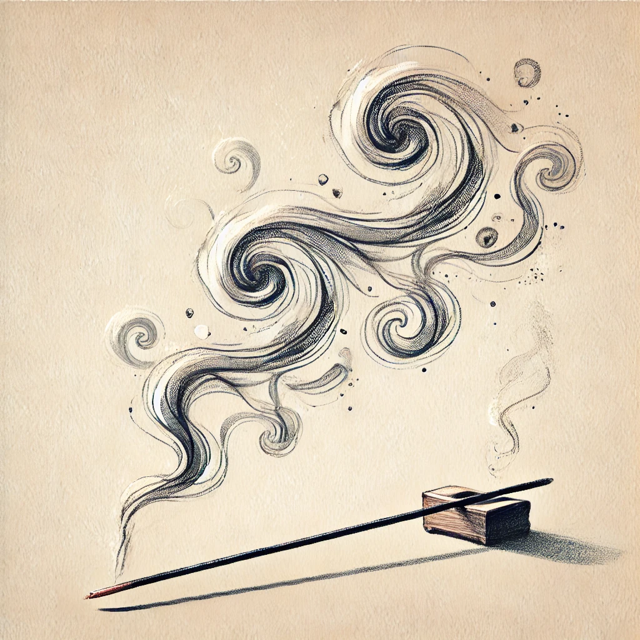
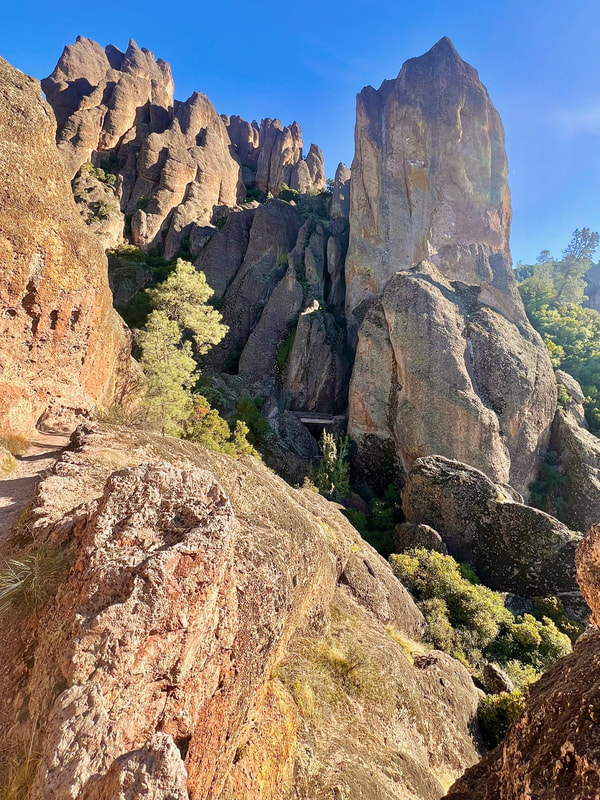
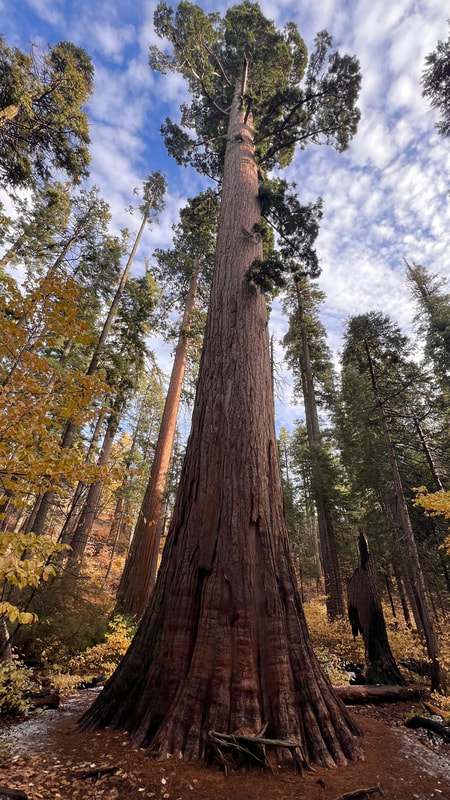

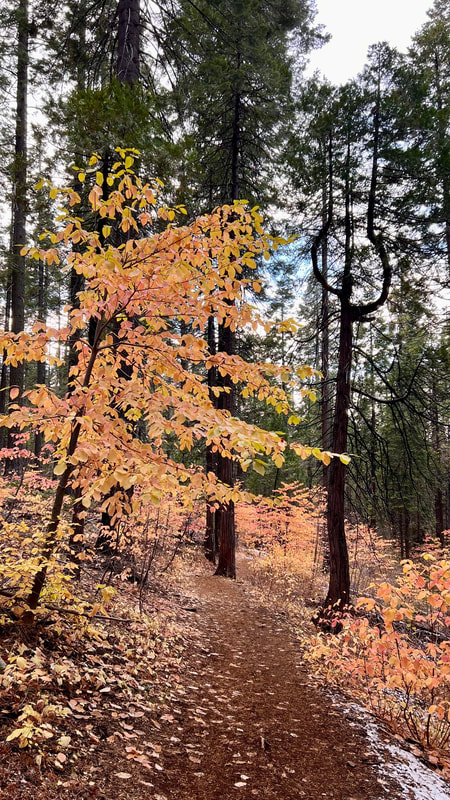
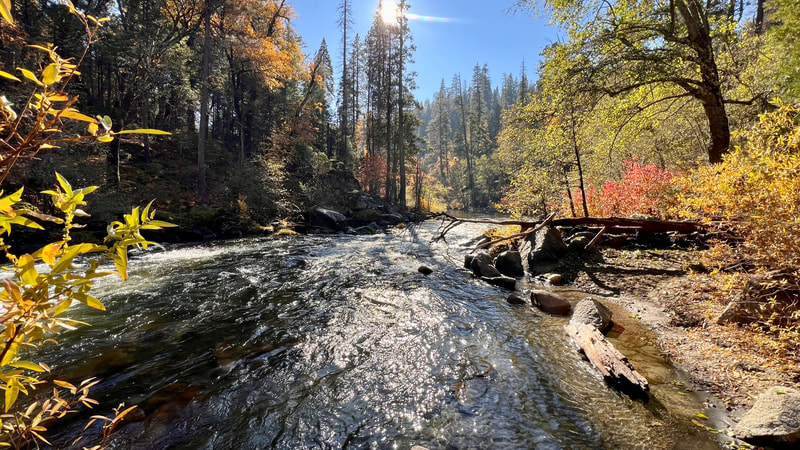
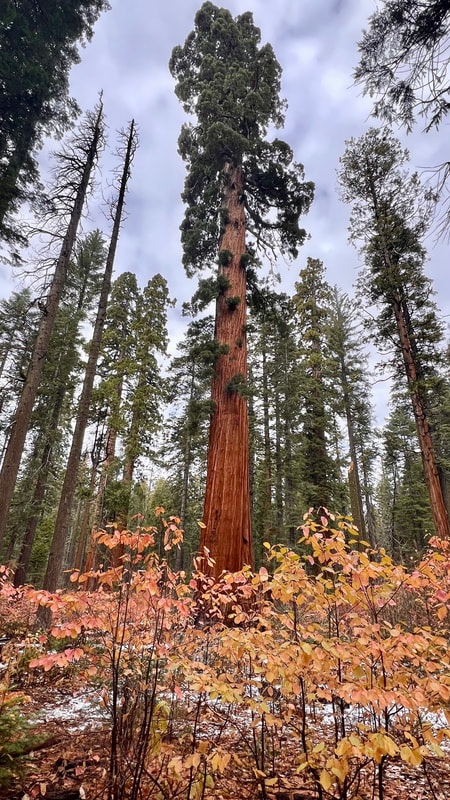
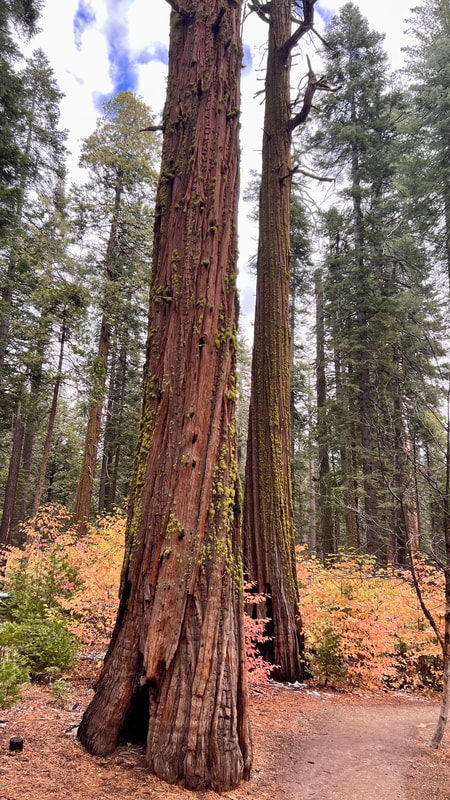
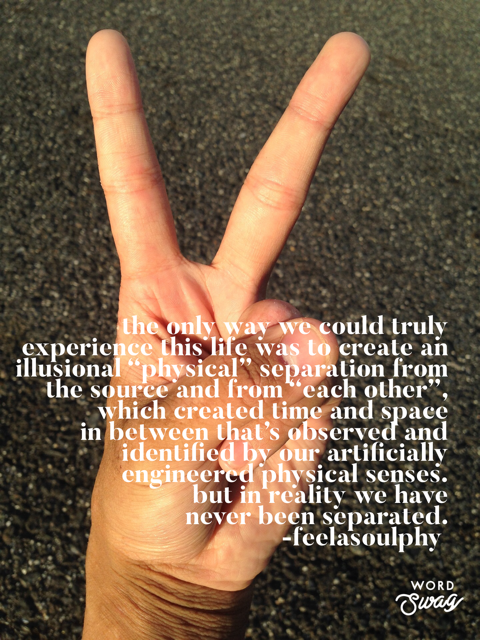
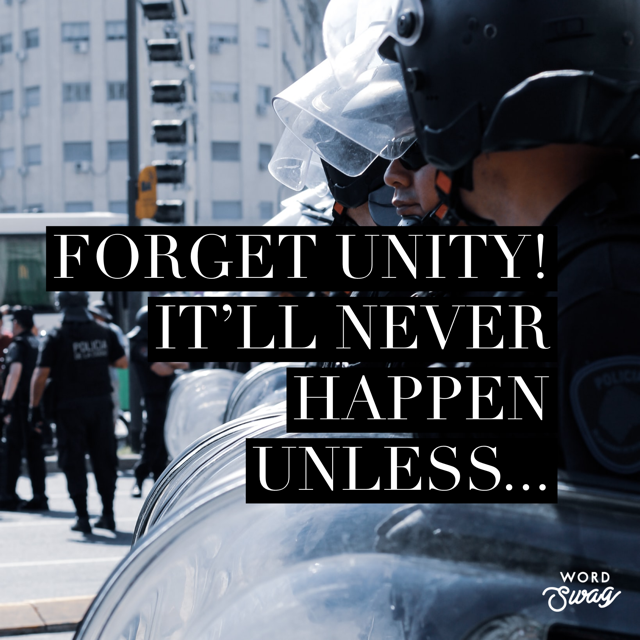
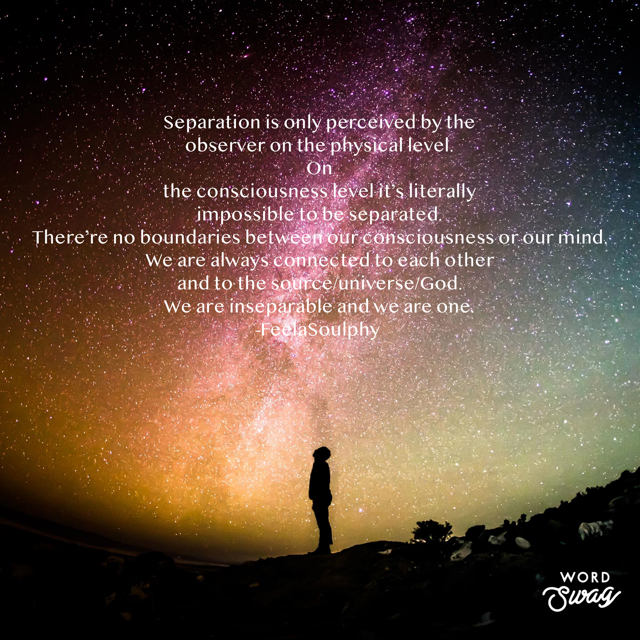
 RSS Feed
RSS Feed